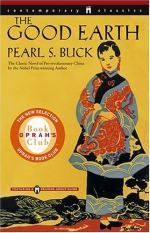|
|
The Good Earth Chapter 11
After Wang Lung pays for the train fare, he buys some bread and rice with the money left over. On the firewagons, there are men and women who have been to the south before, and they talk about the various things to do when one gets to the city. One man tells Wang Lung the right way to buy mats and to beg. Wang Lung is struck by the idea that he must beg in the city; he does not like it. The man also tells him about public kitchens where hungry people can go and fill their bellies with rice gruel for a penny.
When the firewagon stops, Wang Lung leaves his frightened family to buy mats from the market. Looking around to see where he can build a hut, he sees a village of huts along the wall of a big house. O-lan, remembering how to build a hut from her childhood, shapes the mats in certain ways to make a shelter for the family. After the shelter has been taken care of, Wang Lung suggests that they go look for a public kitchen where they can get something to eat. They are almost cheerful at the thought of having something to eat, and pick up their chopsticks and bowls. After walking for awhile, the family comes to two buildings of mats where there are big cauldrons and earthen stoves. People are lined up in multitudes, waiting to be fed. Wang Lung and his family are swept up in the crowds and get their bowls filled.
After eating in the public kitchen, Wang Lung and his family return to the hut to sleep until the next morning. The next day, Wang Lung is at a loss at what to do because they need more money. Looking around the city, there is a general sense of plenitude; no one seems to starve in the city. O-lan suggests that she, the sons, and even the old man beg on the streets. She takes a bowl in her hands and shows the boys how to beg. On the streets, O-lan points to the girl child in her bosom as she begs to evoke sympathy in people. When the children do not take begging seriously, they are scolded and slapped by O-lan who sends them out crying.
Wang Lung rents a ricksha for the day. Pulling the ricksha is initially awkward for him, but he must work if he is to earn any money. While he is practicing pulling, an old man hails him. Deaf, the man does not hear Wang Lung's protests that he is new at ricksha pulling, but tells him to take him to the Confucian temple. Asking his way around as he pulls, Wang Lung reaches the temple gates, and the man pays him. Not used to the work, Wang Lung's body aches, but he is astonished at how easily the money has come. Later, however, it turns out that the old man gave Wang Lung only half of the usual fare. Wang Lung initially does not mind this much until he remembers that he must pay the rental fee for the ricksha. By the end of the day, he has only a penny for himself. Returning to the hut, Wang Lung is distressed and depressed. Life in the city is difficult, and he cannot help yearning for his land. The thought of it gives him momentary peace.
Wang Lung discovers that O-lan and the children have received a small amount of cash from begging that will pay for a meal the next morning. Although he has not received anything, the old man is worry-free. He has worked all his life and feels that now in his old age, he will be well taken care of.




